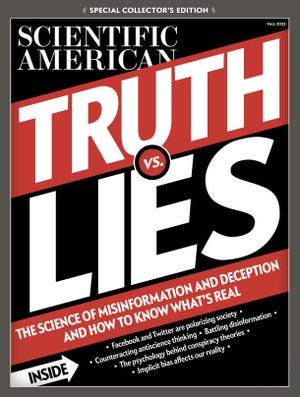
You are currently logged out. Please log in to download the issue PDF.
Features
How Misinformation Spreads--and Why We Trust It
The most effective misinformation starts with seeds of truth
How Professional Truth Seekers Search for Answers
Nine experts describe how they sort signal from noise
Subverting Climate Science in the Classroom
Oil and gas representatives influence the standards for courses and textbooks, from kindergarten to 12th grade
Post-Truth: A Guide for the Perplexed
If politicians can lie without condemnation, what are scientists to do?
Misinformation Has Created a New World Disorder
Our willingness to share content without thinking is exploited to spread disinformation
Schoolkids Are Falling Victim to Disinformation and Conspiracy Fantasies
Although children are prime targets, educators cannot figure out how best to teach them to separate fact from fiction
Corruption Is Contagious
Dishonesty begets dishonesty, rapidly spreading unethical behavior through a society
How to Overcome Antiscientific Thinking
Convincing people who doubt the validity of climate change and evolution to change their beliefs requires overcoming a set of ingrained cognitive biases
Why Your First Idea Can Blind You to a Better One
While we are working through a problem, the brain’s tendency to stick with familiar ideas can literally blind us to superior solutions
When Assessing Novel Risks, Facts Are Not Enough
How we make decisions in the face of incomplete knowledge and uncertainty
People Drawn to Conspiracy Theories Share a Cluster of Psychological Features
Baseless theories threaten our safety and democracy. It turns out that specific emotions make people prone to such thinking
People Who Jump to Conclusions Show Other Kinds of Thinking Errors
Belief in conspiracy theories and overconfidence are two tendencies linked to hasty thinking
Are Toxic Political Conversations Changing How We Feel about Objective Truth?
As political polarization grows, the arguments we have with one another may be shifting our understanding of truth itself
How to Get Better at Embracing Unknowns
How to interpret uncertainty in common forms of data visualization
Information Overload Helps Fake News Spread, and Social Media Knows It
Understanding how algorithm manipulators exploit our cognitive vulnerabilities empowers us to fight back
The Neuroscience of Reality
Reality is constructed by the brain, and no two brains are exactly alike
How to Think about 'Implicit Bias'
Amid a controversy, it’s important to remember that implicit bias is real—and it matters
The Shared Past That Wasn't
How Facebook, fake news and friends are altering memories and changing history

















